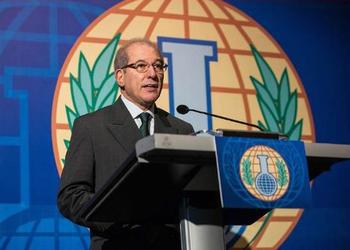
OSLO, Norway, October 11, 2013 (ENS) – The Nobel Peace Prize for 2013 goes to the Organization for the Prohibition of Chemical Weapons for its extensive efforts to eliminate chemical weapons. The honor comes as the OPCW oversees the destruction by Syria of its chemical weapons stockpiles with a deadline of mid-2014.
The prize of 8 million Swedish krona (US$1.2 million) derives from the will of Swedish chemist, entrepreneur and pacifist, Alfred Nobel (1833-1896), the inventor of dynamite.
Announcing the award, the Norwegian Nobel Committee said today, “Disarmament figures prominently in Alfred Nobel’s will. The Norwegian Nobel Committee has through numerous prizes underlined the need to do away with nuclear weapons. By means of the present award to the OPCW, the Committee is seeking to contribute to the elimination of chemical weapons.”
Based in The Hague, The Netherlands, the Organization for the Prohibition of Chemical Weapons works to implement the 1997 Chemical Weapons Convention, acceded to by 189 governments.

In September, Syria joined the convention, under pressure from the international community after chemical weapons attacks in several Damascus neighborhoods on August 21 that killed an estimated 1,429 people, including 426 children.
Calling the ban on chemical weapons “an enduring and universal norm,” OPCW Director-General Ahmet Üzümcü, a Turkish diplomat, said today that he receives the recognition with humility.
Üzümcü said the OPCW is a small organization that has for over 16 years, “away from the glare of international publicity, shouldered an onerous but noble task – to act as the guardian of the global ban on chemical weapons.”
The global ban took effect in 1997 after a 100-year effort following the world’s first chemical weapons attack during World War I. Today the work of the OPCW is more urgent than ever, the director-general said.
“Events in Syria have been a tragic reminder that there remains much work yet to be done. Our hearts go out to the Syrian people who were recently victims of the horror of chemical weapons,” said Üzümcü. “Today we are engaged in work which is meant to ensure that this atrocity is not repeated.”
“Never in the history of our organisation have we been called on to verify a destruction program within such short timeframes – and in an ongoing conflict,” he said. “We are conscious of the enormous trust that the international community has bestowed on us.”
Honoring the “expertise, professionalism and dedication of our staff – qualities that have been forged through a solid record of achievement,” Üzümcü said the organization’s work would not be possible “without the steadfast support and commitment” of the 189 States Parties to the convention.
“The recognition that the Peace Prize brings will spur us to untiring effort, even stronger commitment and greater dedication,” he said. “I truly hope that this award, and the OPCW’s ongoing mission together with the United Nations in Syria, will help broader efforts to achieve peace in that country and end the suffering of its people.”
In 1991, the environmental threat posed by chemical weapons was formally identified when the UN Environmental Programme’s Governing Council declared, “Chemical warfare not only represents a most serious threat to human health and life but also has an anti-environmental dimension, which could attain the level of mass or even total destruction of ecosystems.”
Since the Chemical Weapons Convention came into force, OPCW staff members have conducted more than 5,000 inspections at hundreds of chemical weapons-related sites and nearly 2,000 industrial plants in 86 member states around the world.
In a message to the OPCW staff, Üzümcü said, “You have done so with complete impartiality, winning the confidence of the international community. What has not always been appreciated is that our work is complex and often hazardous – nowhere more so than in the unprecedented challenge presented by our mission in Syria.”
Hailing its work on disarmament and nonproliferation, UN Secretary-General Ban Ki-moon today said, “The OPCW has greatly strengthened the rule of law in the field of disarmament and non-proliferation. Thanks in large measure to its efforts, 80 percent of the declared chemical weapons stockpiles have been destroyed.”
The UN Security Council unanimously adopted a resolution two weeks ago calling for the speedy implementation of procedures drawn up by the OPCW for the “expeditious destruction of the Syrian Arab Republic’s chemical weapons programme and stringent verification thereof.”
Ban said that later today the UN Security Council is expected to approve a first-of-its-kind OPCW-UN Joint Mission in Syria following the landmark work carried out by the UN Chemical Weapons Investigation Mission.
In a letter earlier this week to the Security Council proposing the formal establishment of the joint mission, Ban called the attack an “especially disturbing” event in a conflict that has already killed over 100,000 people and driven some 6.5 million others from their homes since protesters first sought the ouster of President Bashar al-Assad’s Government in March, 2011.”
Speaking today at The Hague, Üzümcü said his organization carries out its work inspiried by an overarching vision. “The OPCW has a specific task – to eliminate chemical weapons and prevent them from ever re-emerging. But it also has a broad mission – to prove that the inhumanity of war can give rise to the humanity of solidarity and international cooperation.”
